-
Tuesday, December 23, 2025
Solidarity that teaches: journalism education as a pillar of media during wartime
On 23 December, the Ivano-Frankivsk Centre for Journalistic Solidarity, together with colleagues from the Volyn, Rivne, Chernihiv and Kherson regions, held a meeting to discuss the challenges faced daily by the media in frontline regions.

-
Thursday, December 04, 2025
How to counter fake AI in the media?
Teachers and students majoring in 061 Journalism at the Department of Ukrainian and Slavic Philology and Journalism of Kherson State University joined the online webinar Artificial Intelligence in Media: Data Journalism, Editorial Policies, and Security.

-
Thursday, November 20, 2025
Kherson State University hosted an online workshop entitled ‘The specifics of working as a journalist in a frontline city: practical and ethical aspects.’
Today, 20 November 2025, the Faculty of Ukrainian and Foreign Philology, Journalism and Arts of Kherson State University held an online workshop entitled ‘The specifics of working as a journalist in a frontline city: practical and ethical aspects’.
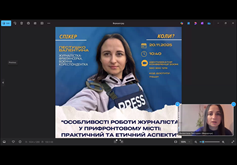
-
Tuesday, November 11, 2025
Students majoring in journalism at Kherson State University won prizes in a student essay competition
Students of Kherson State University won prizes in a student essay competition dedicated to Resolution No. 1325 ‘Women, Peace and Security’
Four female students from Kharkiv State University took an active part in the student essay competition ‘The content and significance of UN Security Council Resolution No. 1325 “Women. Peace. Security”’.

-
Thursday, October 30, 2025
Gender equality as a key vector in the education of future teachers and media professionals
On 30 October 2025, teachers and students of the Department of Ukrainian and Slavic Philology and Journalism of Kharkiv State University took part in a final round table discussion dedicated to analysing the results of the communication campaign ‘Women. Peace. Security’ in the region.

-
Tuesday, October 28, 2025
Lecturer Tamara Mandych took part in the round table discussion ‘Kherson Region Speaks Ukrainian: Identity and Resilience’
On 28 October, Tamara Mandych, lecturer at the Department of Ukrainian and Slavic Philology and Journalism, took part in the round table discussion ‘Kherson Region Speaks Ukrainian: Identity and Resilience’. The presentation was devoted to the linguistic features of the media space in the Kherson region.

-
Monday, October 27, 2025
Radio dictation of national unity - 2025!
Traditionally, one of the locations for writing the Radio Dictation of National Unity at Kherson State University was the Department of Ukrainian and Slavic Philology and Journalism.

-
Thursday, October 16, 2025
How to counter xenophobia: journalism students attend lecture on hate speech
On 16 October, journalism students, together with the guarantor of the educational programme, A.F. Solomakhin, attended an online lecture entitled ‘How to counter xenophobia in wartime. The media aspect.’ 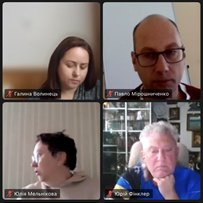
-
Thursday, June 12, 2025
On 12 June 2025, an examination commission for the certification of applicants for the first (bachelor's) level of higher education began its work
On 12 June 2025, an examination commission for the certification of applicants for the first (bachelor's) level of higher education began its work at the Faculty of Ukrainian and Foreign Philology and Journalism of Kherson State University. Today, applicants majoring in 035 Philology and 014 Secondary Education (Language and Literature (Ukrainian)) are demonstrating their knowledge by taking the final professional exam.
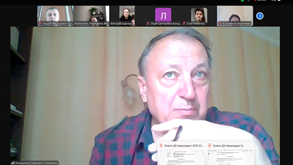
-
Thursday, May 22, 2025
A 3rd year student majoring in Journalism took part in the presentation of the book
‘When There is No Knocking on the Door is a book about life under Russian occupation, co-authored by KSU students. Recently, Valentyna Pestushko (Fedorchuk), a 3rd year student majoring in Journalism at the Faculty of Ukrainian and Foreign Philology and Journalism, took part in the book's presentation in Izmail.

-
Friday, April 11, 2025
IV All-Ukrainian Methodological Workshop for Modern Language Teachers: Day Three
The participants learnt about the possibilities of artificial intelligence in the educational process thanks to the experience of Olena Popova (Kyiv National Linguistic University) and Larysa Makarenko (East Ukrainian National University named after V. Dahl).
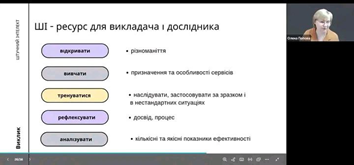
-
Thursday, April 10, 2025
IV All-Ukrainian Methodological Workshop for Modern Language Teachers: Day Two
Today's meetings at the Workshop were full of practical advice and pleasant memories, as the speakers were graduates of Kherson State University!
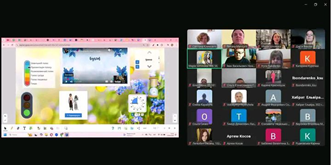
-
Wednesday, April 09, 2025
IV All-Ukrainian Methodological Workshop for Modern Language Teachers: Day One
The IV All-Ukrainian Methodological Workshop of the Modern Teacher of Language began its work under the moderation of Svitlana Klymovych, Head of the Department of Ukrainian and Slavic Philology and Journalism of KSU.
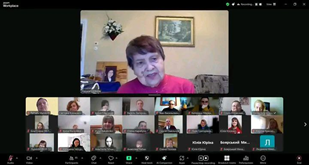
-
Tuesday, March 25, 2025
Updated educational programme: the key to success in journalism
The teachers of the Department of Ukrainian and Slavic Philology and Journalism held a meeting dedicated to the revision and improvement of the educational and professional programme of the speciality ‘Journalism’.
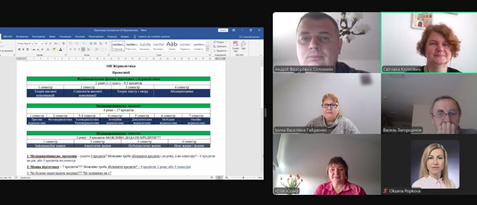
-
Thursday, February 13, 2025
KSU journalism students took part in an online conference dedicated to the 3rd anniversary of Russia's full-scale invasion of Ukraine.
‘Ukrainian media during the war: challenges, experience, future’ is a large-scale international online conference initiated by the National Union of Journalists of Ukraine.
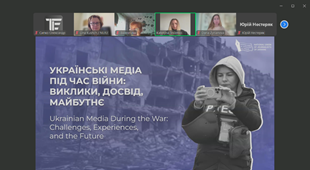
-